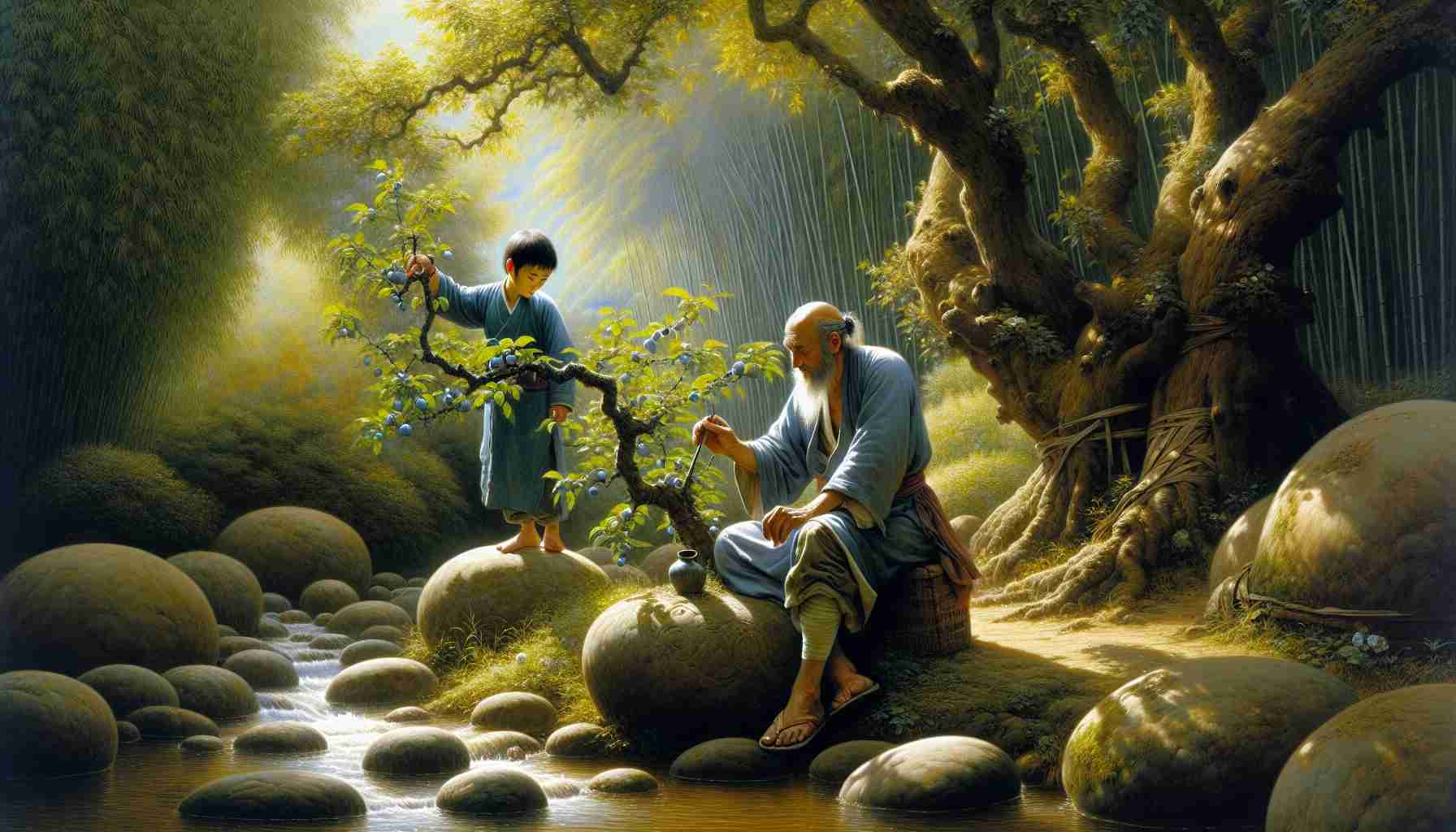

The summer sun glowed gently through the bamboo leaves as I sat on the stone steps outside my grandfather’s home. I was twelve, and tired of everything going wrong. My kite had torn in the wind, I’d spilled the rice bucket, and I’d tried—and failed—to fix the roof tiles, making the leak even worse.
“Why does nothing ever go right when I try so hard?” I grumbled, kicking a pebble down the path.
Grandfather looked up from his garden where he was gently trimming a small plum tree. He didn’t say anything at first, just gave me a soft smile that made me wonder if he had heard me at all.
I sighed louder. “I’m trying my best, but everything keeps breaking.”
He stood slowly, wiped his hands on his blue cloth tunic, and walked to where I sat. “Come, walk with me,” he said, motioning toward the path leading into the woods.
We walked in silence, the kind that isn’t uncomfortable, just quiet and soft like the rustling leaves above. After a while, he pointed to a small stream. Water danced over the rocks without a care.
“Do you see how the water flows?” he asked.
“Yes.” I shrugged. “It goes around everything.”
Grandfather smiled. “And yet, it reaches the ocean without needing to push.”
I frowned, not entirely sure what he meant.
He sat on a smooth stone by the stream and patted the space beside him.
“In Taoism,” he said gently, “we call this Wu Wei—doing without doing. It doesn't mean you do nothing. It means you learn when to act and when to allow things to be.”
“But if I don’t try hard,” I said, “nothing gets done!”
He nodded. “That’s what many people think. But sometimes, trying too hard is like squeezing soap too tight—it just slips away. When you act with the flow of the world, like the stream, things unfold more easily.”
I watched the stream. The fish swam calmly. The leaves floated past like lazy boats. And yet, everything moved.
We sat and listened. I didn’t have to fix anything. I didn’t have to prove anything. For the first time that day, I felt okay.
The next morning, I didn’t rush to fix the roof. Instead, I sat with Grandfather and watched how he worked. Slowly, calmly. He placed the tiles one by one, letting them settle, never forcing them. Somehow—it worked better that way.
Days passed, and I started to change. I stopped trying to control everything. I listened more. I acted slower. And strangely enough, things stopped going wrong so often.
I didn’t understand all of the Tao yet, but I had felt a little piece of it flowing through me like the stream. I realized that sometimes, by doing less, I could do more.
Even now, when I feel the urge to push too hard, I remember that stream. I let go a little, breathe, and trust in the quiet power of the Tao.
The summer sun glowed gently through the bamboo leaves as I sat on the stone steps outside my grandfather’s home. I was twelve, and tired of everything going wrong. My kite had torn in the wind, I’d spilled the rice bucket, and I’d tried—and failed—to fix the roof tiles, making the leak even worse.
“Why does nothing ever go right when I try so hard?” I grumbled, kicking a pebble down the path.
Grandfather looked up from his garden where he was gently trimming a small plum tree. He didn’t say anything at first, just gave me a soft smile that made me wonder if he had heard me at all.
I sighed louder. “I’m trying my best, but everything keeps breaking.”
He stood slowly, wiped his hands on his blue cloth tunic, and walked to where I sat. “Come, walk with me,” he said, motioning toward the path leading into the woods.
We walked in silence, the kind that isn’t uncomfortable, just quiet and soft like the rustling leaves above. After a while, he pointed to a small stream. Water danced over the rocks without a care.
“Do you see how the water flows?” he asked.
“Yes.” I shrugged. “It goes around everything.”
Grandfather smiled. “And yet, it reaches the ocean without needing to push.”
I frowned, not entirely sure what he meant.
He sat on a smooth stone by the stream and patted the space beside him.
“In Taoism,” he said gently, “we call this Wu Wei—doing without doing. It doesn't mean you do nothing. It means you learn when to act and when to allow things to be.”
“But if I don’t try hard,” I said, “nothing gets done!”
He nodded. “That’s what many people think. But sometimes, trying too hard is like squeezing soap too tight—it just slips away. When you act with the flow of the world, like the stream, things unfold more easily.”
I watched the stream. The fish swam calmly. The leaves floated past like lazy boats. And yet, everything moved.
We sat and listened. I didn’t have to fix anything. I didn’t have to prove anything. For the first time that day, I felt okay.
The next morning, I didn’t rush to fix the roof. Instead, I sat with Grandfather and watched how he worked. Slowly, calmly. He placed the tiles one by one, letting them settle, never forcing them. Somehow—it worked better that way.
Days passed, and I started to change. I stopped trying to control everything. I listened more. I acted slower. And strangely enough, things stopped going wrong so often.
I didn’t understand all of the Tao yet, but I had felt a little piece of it flowing through me like the stream. I realized that sometimes, by doing less, I could do more.
Even now, when I feel the urge to push too hard, I remember that stream. I let go a little, breathe, and trust in the quiet power of the Tao.